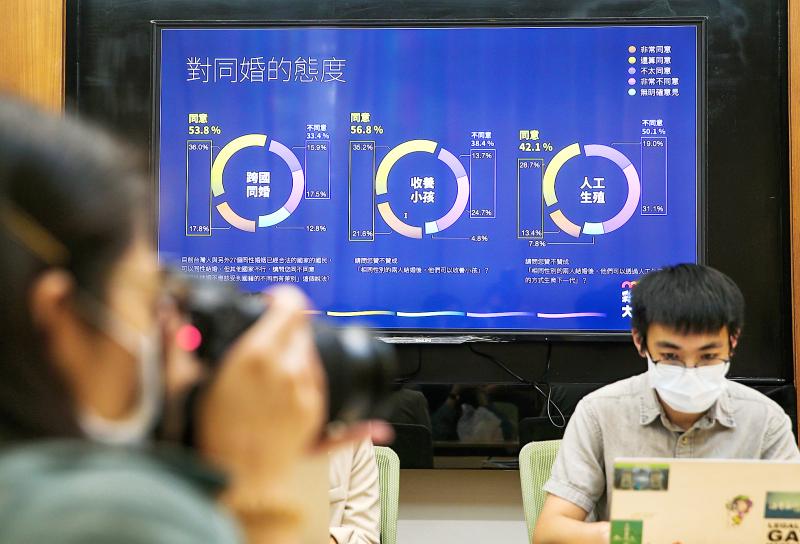As Taiwan approaches the one-year anniversary of its legalization of same-sex marriage on May 24, the results of a survey released yesterday showed that nearly 93 percent of Taiwanese say that the policy has had no effect on them.
Equal Love Taiwan — a coalition of five LGBT rights organizations — announced at a news conference the results of the survey it conducted on the Taiwanese public’s attitude toward a range of issues affecting the LGBT community.
The survey found that 92.8 percent of respondents had not been affected by the legalization of same-sex marriage, while 3.7 percent cited negative effects, 1.8 percent cited positive effects and 1.7 percent had no opinion on the matter.

Photo: CNA
In terms of the policy’s effects on Taiwanese society, 50.1 percent said that there had been no effect, while 28.4 percent said that the effect was negative, while 11.9 percent said that it was positive and 9.6 percent expressed no opinion.
The survey also revealed relatively mixed opinions on issues relating to children.
A total of 56.8 percent of respondents said that they favored allowing same-sex couples to adopt children, compared with 38.4 against, but 50.1 percent were opposed to allowing them to have children using artificial reproductive technologies, while 42.1 percent were in favor.
On the issue of social acceptance, more than 65 percent of those surveyed said they could accept learning that a family member, classmate or coworker identified as homosexual.
However, 49.2 percent said that they could accept learning that their own child was gay, while 47.3 percent said that it would be “difficult to accept.”
Asked about public displays of affection, 74.1 percent of respondents said that they could accept seeing heterosexual couples kiss in public, compared with only 48.2 percent for same-sex couples.
The survey also found that 53 percent of the respondents would accept their child learning about LGBT-related topics in school, even though a November 2018 referendum on including LGBT education in Taiwan’s elementary and junior-high school curricula was defeated by a 66 percent to 34 percent margin.
The survey results came nearly one year after Taiwan became the first nation in Asia to legalize same-sex marriage on May 24 last year.
Although LGBT rights advocates welcomed the passage of the Enforcement Act of Judicial Yuan Constitutional Interpretation No. 748 (司法院釋字第748號解釋施行法), they have also criticized it for failing to provide equal adoption rights and for not recognizing marriages to foreigners whose countries do not allow same-sex marriage.
Meanwhile, same-sex marriage opponents have said that the policy lacks popular support, citing the results of a November 2018 referendum in which voters chose to uphold the concept of marriage as being between a man and a woman.
The Equal Love Taiwan survey was conducted by telephone from April 29 to May 2 and collected 1,086 valid responses from people aged 18 and older. It has a margin of error of 3 percentage points.

POSITIVE DEVELOPMENT: Japan and the US are expected to hold in-depth discussions on Taiwan-related issues during the meeting next month, Japanese sources said The holding of a Japan-US leaders’ meeting ahead of US President Donald Trump’s visit to China is positive news for Taiwan, former Japan-Taiwan Exchange Association representative Hiroyasu Izumi said yesterday. After the Liberal Democratic Party’s landslide victory in Japan’s House of Representatives election, Japanese Prime Minister Sanae Takaichi is scheduled to visit the US next month, where she is to meet with Trump ahead of the US president’s planned visit to China from March 31 to April 2 for a meeting with Chinese President Xi Jinping (習近平). Japan and the US are expected to hold in-depth discussions on Taiwan-related issues during the

‘LIKE-MINDED PARTNER’: Tako van Popta said it would be inappropriate to delay signing the deal with Taiwan because of China, adding he would promote the issue Canadian senators have stressed Taiwan’s importance for international trade and expressed enthusiasm for ensuring the Taiwan-Canada trade cooperation framework agreement is implemented this year. Representative to Canada Harry Tseng (曾厚仁) in an interview with the Central News Agency (CNA) said he was increasingly uneasy about Ottawa’s delays in signing the agreement, especially as Ottawa has warmed toward Beijing. There are “no negotiations left. Not only [is it] initialed, we have three versions of the text ready: English, French and Mandarin,” Tseng said. “That tells you how close we are to the final signature.” Tseng said that he hoped Canadian Prime Minister Mark Carney

President William Lai (賴清德) yesterday bestowed one of Taiwan’s highest honors on Saint Vincent and the Grenadines (SVG) Ambassador Andrea Clare Bowman in recognition of her contributions to bilateral ties. “By conferring the Order of Brilliant Star with Grand Cordon on Ambassador Bowman today, I want to sincerely thank her, on behalf of the Taiwanese people, for her outstanding contribution to deepening diplomatic ties between Taiwan and SVG,” Lai said at a ceremony held at the Presidential Office in Taipei. He noted that Bowman became SVG’s first ambassador to Taiwan in 2019 and

A man walks past elementary school artworks at the Taipei Lantern Festival in Ximen District yesterday, the first day of the event. The festival is to run from 5pm to 10pm through March 15.